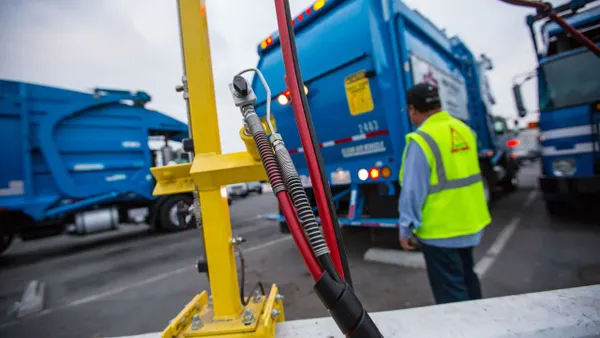Dive Brief:
- Trade associations from both the waste and food industries recently asked New York's Department of Sanitation (DSNY) to withdraw a proposed commercial organics diversion rule for reconsideration due to multiple concerns. The request came in a letter, submitted ahead of an Oct. 31 hearing on the proposal, that was jointly signed by the National Waste & Recycling Association's local chapter, New Yorkers for Responsible Waste Management, Food Industry Alliance of New York State, New York State Restaurant Association, New York City Hospitality Alliance and National Supermarket Association.
- While the letter say these associations "support the city's commitment to the diversion of organic waste," it raises multiple pages' worth of questions about regional processing capacity, stakeholder consultation, costs and other factors. The letter also calls for parallel consideration of a residential organics diversion mandate, in the spirit of mandatory recycling rules throughout the city.
- Following the hearing, DSNY will now assess all of the comments it received and the rule could take effect six months after a decision to adopt it. "We will take these comments into account as we finalize these rules. We look forward to continuing to work with a range of stakeholders to help meet our goal of sending zero waste to landfills by 2030," wrote DSNY Deputy Commissioner Vito Turso via email.
Dive Insight:
This proposed rule would add a second category of generators to DSNY's existing commercial organics diversion rule, which took full effect in January. While that first rule covered close to 300 of New York's largest generators — stadiums, arenas, hotels, distributors — this new proposal would add an estimated 2,000 more businesses to the list. Among that new group would be large restaurants, grocery stores and retail or chain establishments of a certain size. Eligibility is based on square footage, number of locations in the city and other factors.
The potential inclusion of national or regional companies on that list has created a different atmosphere around this new proposal than in the past. Possibly anticipating the type of legal challenges it has experienced with policies on expanded polystyrene foam, DSNY was hesitant to release the assessment of regional organics processing capacity until days before the hearing. According to the joint letter, this assessment didn't include sufficient information on factors such as permit length, regional competition or transportation cost for the various facilities listed. Because interest in organics diversion has increased in nearby Philadelphia, New England, and the state of New York itself, there may be multiple sources looking to use this infrastructure. The letter also raises questions about factoring in local capacity from community composting and various on-site processing devices.
Since DSNY announced its intentions to expand the commercial diversion requirements earlier this summer, the agency has been adamant that sufficient capacity exists and has pushed the idea as part of New York's broader 2030 "zero waste" goals. Groups such as the Transform Don't Trash NYC Coalition and Natural Resources Defense Council have also been supportive of the expansion, in connection with ongoing discussions about a commercial waste franchise system.
Multiple companies in the city's commercial waste industry have already made investments in organics collection and handling technology, both to meet the needs of establishments covered under DSNY's current rule or those that are participating voluntarily. Technically, this newly proposed rule doesn't require companies to offer the service, though the industry says it risks losing customers that might be required to divert their organics otherwise. Some amount of discussion is to be expected for any New York rulemaking and the city isn't unique in facing questions about processing capacity or the pace of its organics diversion ambitions.










